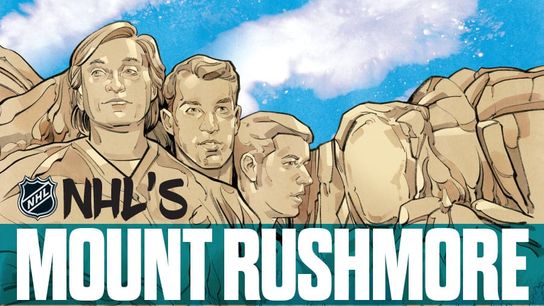A month ago, the editors at The Hockey News reached out and asked if I'd participate in a project aimed at determining the NHL's all-time Mount Rushmore. They chose three automatics -- Wayne Gretzky, Bobby Orr and Gordie Howe -- but left the rest up for debate, assigning potential candidates for the fourth for people like me to argue.
Well, let's just say I took the assignment in a different direction.
The December edition of the sport's weekly bible has the full discussion from all the authors, but I'll share with you my contribution below, with my thanks to the THN editors for their invitation and, honestly, for publishing something that veered this far off their rails:
____________________
Mario Lemieux doesn’t belong on anyone’s Mount Rushmore of Hockey, if only because he deserves his own peak.
No one has ever performed at a higher level.
No one has ever produced a more complete package.
That, ultimately, should be the signature for the career of No. 66. He wasn’t the most prolific, like Wayne Gretzky. He didn’t revolutionize the game, like Bobby Orr. He never could lay claim to a transcendent nickname like ‘Mr. Hockey,’ like Gordie Howe. But 'Le Magnifique,’ which is as close as Lemieux would come to one that stuck, brought a combination of size and speed, skill and smarts, finesse and finish, Jean Beliveau-level grace and championship-level grit, and when put together, it was the likes of which the sport’s never seen before or since inside a single sweater.
Lemieux was exactly what his surname means in his native French: The best.
I’m a born and bred Pittsburgher. I’ve been blessed to have witnessed and/or covered the entirety of Lemieux’s career in our city, one that’s almost universally acknowledged here to have exceeded even those of baseball legends Honus Wagner and Roberto Clemente, football treasures ‘Mean’ Joe Greene and Terry Bradshaw or, for that matter, Sidney Crosby, Evgeni Malkin and Jaromir Jagr in his own sport.
I’ve also come to know the man off the ice. The impassioned owner who’s added three Stanley Cup rings in that role to the two as team captain in 1991 and 1992. The tireless philanthropist who’s committed — along with wife Nathalie — to building children’s playrooms inside local hospitals. The loving father to four children. The loyal friend, helping alumni in need for decades.
He’s the ultimate athlete, the ultimate Pittsburgher. And I can’t help, in that context, but bring bias to this conversation.
But here’s what I also won’t bring: Numbers.
Oh, I could rattle off that his 1.883 points per game were the second-highest in NHL history, only to Gretzky’s 1.921, and he achieved that despite a dismal supporting cast his first half-decade in the league — zero playoff appearances — unlike Gretzky’s accompaniment from an array of future Hall of Famers in Edmonton. Add to that Lemieux’s bouts with cancer and crippling back pain that limited him to 572 fewer games than Gretzky, the equivalent of nearly seven full seasons. And that Lemieux's later entry into the league, five years after Gretzky, exposed him to a much more challenging NHL, with international players arriving, goaltending equipment ballooning and the Devils and other teams adopting defensive postures.
Durability is part of any sport, and Gretzky deserves credit for his. But the gap in games, the vastly superior supporting cast with the Oilers in his early tenure and the slight difference in eras are all Gretzky’s ever had on Lemieux numerically on a per-game basis.
So again, forget the numbers. What matters is what made Lemieux the best. And since Gretzky is much more broadly perceived to have been better, the head-to-head comparison is the only way to build a case.
That’s academic:
• Lemieux had a stronger, harder, more accurate shot. The legendary Soviet coach Viktor Tikhonov called Lemieux the greatest goal-scorer he’d ever seen after Lemieux’s iconic goal in the 1987 Canada Cup — with a Gretzky assist, magically enough — in Hamilton, Ontario. And Lemieux could finish 1,000 different ways, whether from the power-play point or on breakaway moves that Gretzky never had — he’d speak of that openly —or, upon emerging from retirement, a deadly one-timer from the left side that often reminded (almost) of Brett Hull.
• Lemieux’s 6-foot-4 stature obviously dwarfed Gretzky’s 5-11 and, though that sometimes worked against him in that he was an easier target for physical abuse, he also made extraordinary use of it with what the Pittsburgh Post-Gazette’s Hall of Fame writer Dave Molinari used to call ‘pterodactyl-like reach,’ as well as using it to boost his seamless stride. Not to mention the occasional bit of nastiness.
• Lemieux was a faster, smoother skater, even with that extra size. Once he got going, he wasn’t caught. Gretzky’s skating strength was in his shiftiness.
• Lemieux had mesmerizing stickhandling and one-on-one skills, especially in his first few years. Gretzky couldn’t come close in this regard. One would go right at defenders, and the other would curl and survey the scene. Different styles, sure, but also a different caliber of arsenals.
• Lemieux had vision either approaching or equal to Gretzky’s, as well as a passing touch to match. This one, to me, always nullified any and all arguments comparing the two, as it was easily Gretzky’s most superlative trait but one that Lemieux routinely rivaled.
• Lemieux didn’t always care to play defense, but when he did, no less an authority than Scotty Bowman called him the best defensive forward he’d ever coached. Defense was seldom needed or sought from Gretzky.
This list could run longer, but the point’s complete: If Lemieux is the most talented player who ever lived — and since he was more talented than Gretzky, he absolutely was — then that’s what carves out his own special, iconic place in hockey history.
Maybe he can wave to those three anointed Mount Rushmore fixtures from across the figurative valley.

